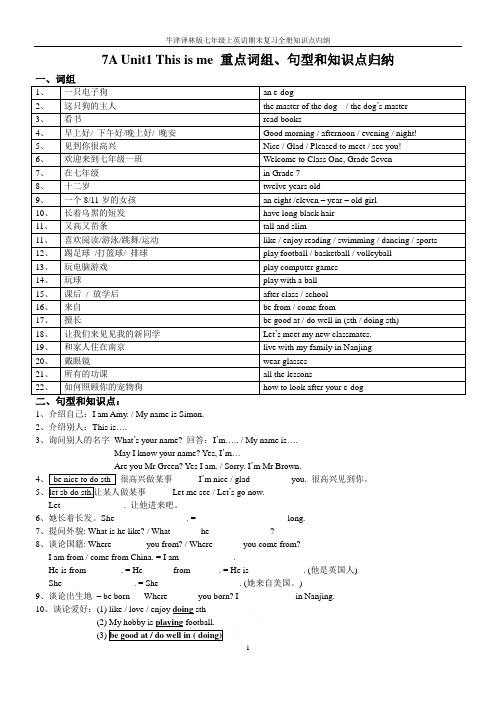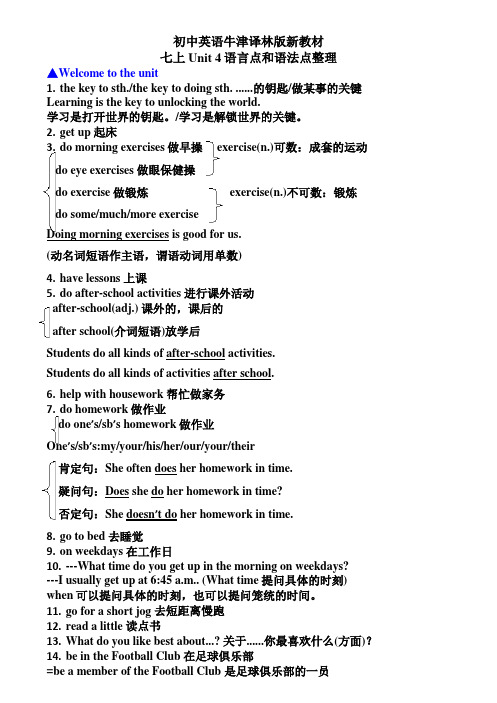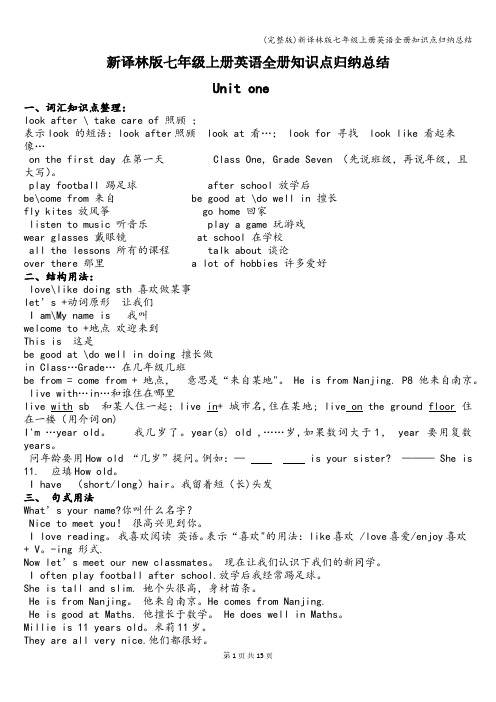牛津译林版七年级上册英语各单元语法知识点复习提纲(全面!)
牛津译林版七年级上英语期末复习全册知识点归纳

7A Unit1 This is me 重点词组、句型和知识点归纳1、介绍自己:I am Amy. / My name is Simon.2、介绍别人:This is….3、询问别人的名字What’s your name? 回答:I’m….. / My name is….May I know your name? Yes, I’m…Are you Mr Green? Yes I am. / Sorry. I’m Mr Brown.4很高兴做某事I’m nice / glad _________you. 很高兴见到你。
5Let me see / Let’s go now.Let ______________. 让他进来吧。
6、她长着长发。
She _____ _____ _____. = _______ ______ ______ long.7、提问外貌: What is he like? / What ______ he ______ _______?8、谈论国籍: Where _______ you from? / Where ______ you come from?I am from / come from China. = I am ____________.He is from _______ . = He ______ from ______. = He is ____________. (他是英国人)She ________________. = She __________________. (她来自美国。
)9、谈论出生地–10、谈论爱好:She is good at swimming. = She does well in dancing. = She ______ ______.= She is a _____ _______.注意do well in 的否定句例如:他不擅长跳舞。
牛津译林版英语七年级上册各单元重点总结

牛津译林版英语七年级上册各单元重点总结Unit 1: Greetings and Introductions- Key phrases: Hello, Hi, Goodbye, Nice to meet you, What's your name?, My name is...- Basic conversation skills: Greeting people, introducing oneself and others- Vocabulary: Greetings, names of people and countriesUnit 2: Classroom Language- Basic classroom instructions: polite ways to ask for permission, give instructions, and perform actions- Vocabulary: Classroom objects, actions, and instructionsUnit 3: Numbers and Colors- Key phrases: How old are you?, What's your favorite color?, It's red.- Basic conversation skills: Asking about age, talking about favorite colors, describing colors- Vocabulary: Numbers, colors, ageUnit 4: My Family- Key phrases: How many people are there in your family?, This is my mother/father/sister/brother.- Basic conversation skills: Talking about family members, describing family relationships- Vocabulary: Family members, possessive pronounsUnit 5: My School- Key phrases: What's your favorite subject?, Do you like...?, Yes, I do. / No, I don't.- Basic conversation skills: Talking about school subjects, expressing likes and dislikes- Vocabulary: School subjects, opinionsUnit 6: My Friends- Key phrases: Who's your best friend?, What does he/she look like?, He/She is...- Basic conversation skills: Talking about friends, describing appearance- Vocabulary: Words to describe people's physical appearanceUnit 7: Free Time Activities- Key phrases: What do you do in your free time?, I like playing football / reading books / listening to music.- Basic conversation skills: Talking about hobbies and free time activities- Vocabulary: Hobbies and leisure activitiesUnit 8: Daily Routines- Key phrases: What time do you get up/go to bed/eat breakfast?, I get up at.../Go to bed at.../Eat breakfast at...- Basic conversation skills: Talking about daily routines and telling the time- Vocabulary: Daily activities, timeUnit 9: Food and Drinks- Key phrases: Do you like...?, Yes, I do. / No, I don't., Can I have some...?, Sure, here you are.- Basic conversation skills: Talking about food preferences, ordering food and drinks- Vocabulary: Food and drinks, likes and dislikesUnit 10: Clothes- Key phrases: What are you wearing?, I'm wearing a T-shirt/trousers/skirt/shoes, etc.- Basic conversation skills: Talking about clothes and describing what someone is wearing- Vocabulary: Clothing itemsUnit 11: Weather- Key phrases: What's the weather like today?, It'ssunny/rainy/cloudy/windy, etc.- Basic conversation skills: Talking about the weather and describing weather conditions- Vocabulary: Weather words and phrasesUnit 12: Holidays and Celebrations- Key phrases: When is...?, It's on..., What do people do on...?, People usually...- Basic conversation skills: Talking about holidays and celebrations, discussing traditions and customs- Vocabulary: Holidays and celebrations, activities以上是牛津译林版英语七年级上册各单元的重点总结,希望对您有所帮助。
牛津译林版七年级上册(2024)Unit 4 School day 语言点和语法点整理

初中英语牛津译林版新教材七上Unit 4语言点和语法点整理▲Welcome to the unit1.the key to sth./the key to doing sth. ......的钥匙/做某事的关键Learning is the key to unlocking the world.学习是打开世界的钥匙。
/学习是解锁世界的关键。
2.get up 起床3.do morning exercises做早操 exercise(n.)可数:成套的运动 do eye exercises 做眼保健操do exercise 做锻炼 exercise(n.)不可数:锻炼do some/much/more exerciseDoing morning exercises is good for us.(动名词短语作主语,谓语动词用单数)4.have lessons 上课5.do after-school activities 进行课外活动after-school(adj.) 课外的,课后的after school(介词短语)放学后Students do all kinds of after-school activities.Students do all kinds of activities after school.6.help with housework 帮忙做家务7.do homework做作业do one’s/sb’s homework做作业One’s/sb’s:my/your/his/her/our/your/their肯定句:She often does her homework in time.疑问句:Does she do her homework in time?否定句:She doesn’t do her homework in time.8.go to bed 去睡觉9.on weekdays 在工作日10.---What time do you get up in the morning on weekdays?---I usually get up at 6:45 a.m.. (What time提问具体的时刻) when可以提问具体的时刻,也可以提问笼统的时间。
牛津译林版英语七年级上册分单元知识点归纳总结(Unit1-8))

牛津译林版英语七年级上册全册知识点归纳总结(最新)一、词汇知识点整理:\ 照顾 ;表示的短语:照顾看…;寻找看起来像…在第一天 , (先说班级,再说年级,且大写)。
踢足球放学后\ 来自 \ 擅长放风筝回家听音乐 a 玩游戏戴眼镜在学校所有的课程谈论那里 a 许多爱好二、结构用法:\ 喜欢做某事’s +动词原形让我们I \ 我叫+地点欢迎来到这是\ 擅长做……在几年级几班= + 地点, 意思是“来自某地”。
Nanjing. P8 他来自南京。
……和谁住在哪里和某人住一起;城市名,住在某地;住在一楼(用介词)I’m … . 我几岁了。
(s) ,……岁,如果数词大于1,要用复数.问年龄要用“几岁”提问。
例如:- ? 11. 应填 .I ().我留着短(长)头发三、句式用法’s ?你叫什么名字?! 很高兴见到你。
I . 我喜欢阅读英语.表示“喜欢”的用法:喜欢喜爱喜欢 + 形式。
’s . 现在让我们认识下我们的新同学。
I .放学后我经常踢足球。
. 她个头很高,身材苗条。
Nanjing. 他来自南京。
Nanjing.. 他擅长于数学。
.11 .米莉11岁。
.他们都很好。
I . 我擅长于跳舞。
四、语法归纳:连系动词的一般现在时动词的三变化 .我(I)用 ,你()用用于他()她()它(),单数名词用,复数名词都用句型结构:1、肯定句:主语\\ … a .2、否定句:主语\\… a .3、一般疑问句:\\主语+其他? a ? 回答 , . , ’t4、特殊疑问句:疑问句 +主语+其他?’s ?语法小练习:用动词的适当形式填空1、 . .2、 I3、? a4、 ? , I5、 ? .一、词汇知识点整理:做运动 a 一天许多次踢足球/打网球谈论放学后去游泳a …中的一员来自听音乐在下届世界杯实现’s 在某人的空闲时间住/生活在看书在周末待在家里 a 许多问某人某事在电视上看篮球比赛感觉特棒二、结构用法:?做…怎么样?喜欢做某事使某人/某物使某人做某事想要做某事希望做某事做某事开心三、句式用法I . 我喜欢散步。
(完整版)新译林版七年级上册英语全册知识点归纳总结

新译林版七年级上册英语全册知识点归纳总结Unit one一、词汇知识点整理:look after \ take care of 照顾 ;表示look 的短语:look after照顾 look at 看…; look for 寻找 look like 看起来像…on the first day 在第一天 Class One, Grade Seven (先说班级,再说年级,且大写)。
play football 踢足球 after school 放学后be\come from 来自 be good at \do well in 擅长fly kites 放风筝 go home 回家listen to music 听音乐 play a game 玩游戏 wear glasses 戴眼镜 at school 在学校all the lessons 所有的课程 talk about 谈论 over there 那里 a lot of hobbies 许多爱好二、结构用法:love\like doing sth 喜欢做某事let’s +动词原形 让我们I am\My name is 我叫welcome to +地点 欢迎来到This is 这是be good at \do well in doing 擅长做in Class…Grade… 在几年级几班be from = come from + 地点, 意思是“来自某地"。
He is from Nanjing. P8 他来自南京。
live with…in…和谁住在哪里live with sb 和某人住一起;live in+ 城市名,住在某地; live on the ground floor 住在一楼(用介词on)I'm …year old。
我几岁了。
year(s) old ,……岁,如果数词大于1, year 要用复数years。
问年龄要用How old “几岁”提问。
牛津译林版英语七年级(上册)分单元知识点归纳总结[Unit1_8]]
![牛津译林版英语七年级(上册)分单元知识点归纳总结[Unit1_8]]](https://img.taocdn.com/s3/m/0e173f3e7cd184254b353535.png)
牛津译林版英语七年级上册全册知识点归纳总结(最新)Unit one一、词汇知识点整理:look after \ take care of 照顾 ;表示look 的短语:look after照顾look at 看…;look for 寻找look like 看起来像…on the first day 在第一天 Class One, Grade Seven (先说班级,再说年级,且大写)。
play football 踢足球 after school 放学后be\come from 来自 be good at \do well in 擅长fly kites 放风筝 go home 回家listen to music 听音乐 play a game 玩游戏wear glasses 戴眼镜 at school 在学校all the lessons 所有的课程 talk about 谈论over there 那里 a lot of hobbies 许多爱好二、结构用法:love\like doing sth 喜欢做某事let’s +动词原形让我们I am\My name is 我叫welcome to +地点欢迎来到This is 这是be good at \do well in doing 擅长做in Class…Grade…在几年级几班be from = come from + 地点, 意思是“来自某地”。
He is from Nanjing. P8 他来自南京。
live with…in…和谁住在哪里live with sb 和某人住一起;live in+ 城市名,住在某地; live on the ground floor 住在一楼(用介词on)I’m …year old. 我几岁了。
year(s) old ,……岁,如果数词大于1, year 要用复数years.问年龄要用How old “几岁”提问。
牛津译林版七年级上册英语各单元语法知识点复习提纲(全面!)
牛津译林版七年级上册英语各单元语法知识点复习提纲Unit1 Dream homes【重点词汇】1. shareshare作及物动词,意为“分享”。
常用结构:share sth. with sb.意为“和某人合用某物;和某人分享某物”。
如:I'm afraid you have to share a table with others.我恐怕你得和别人合用一张桌子。
I often share my snacks with my classmates.我经常和同学分享零食。
2. dreamdream作名词时,意为“梦,梦想”;作形容词时,意为“理想的,不切实际的”;作动词时,意为“做梦”,常用于结构:dream of/about...(梦到……)或dream of/ about doing sth.梦想做某事。
如:Millie has a dream to have a big house米莉梦想拥有一幢大房子My dream house is a house with a big garden.我梦寐以求的房子是一幢带有大花园的房子。
I dreamed of my English teacher last night.我昨晚梦到了我的英语老师Amy dreams of being a singer when she grows up.埃米梦想长大后成为一名歌手。
3. ownown作形容词.意为“自己的,属于自己的”,常和形容词性物主代词连用,构成短语of one'sown,表示“属于某人自己的”,on one's own = alone,意为“独自地”。
own作动词时,表示“拥有”。
如:I have my own computer我有属于我自己的电脑。
That's a car of her own.那是她自己的汽车。
He lives on his own.他一个人生活。
(完整版)新译林版七年级上册英语全册知识点归纳总结
新译林版七年级上册英语全册知识点归纳总结Unit one一、词汇知识点整理:look after \ take care of 照顾 ;表示look 的短语:look after照顾 look at 看…; look for 寻找 look like 看起来像…on the first day 在第一天 Class One, Grade Seven (先说班级,再说年级,且大写)。
play football 踢足球 after school 放学后be\come from 来自 be good at \do well in 擅长fly kites 放风筝 go home 回家listen to music 听音乐 play a game 玩游戏 wear glasses 戴眼镜 at school 在学校all the lessons 所有的课程 talk about 谈论 over there 那里 a lot of hobbies 许多爱好二、结构用法:love\like doing sth 喜欢做某事let’s +动词原形 让我们I am\My name is 我叫welcome to +地点 欢迎来到This is 这是be good at \do well in doing 擅长做in Class…Grade… 在几年级几班be from = come from + 地点, 意思是“来自某地"。
He is from Nanjing. P8 他来自南京。
live with…in…和谁住在哪里live with sb 和某人住一起;live in+ 城市名,住在某地; live on the ground floor 住在一楼(用介词on)I'm …year old。
我几岁了。
year(s) old ,……岁,如果数词大于1, year 要用复数years。
问年龄要用How old “几岁”提问。
牛津译林版七年级英语上册全册知识点汇总(Unit1-8)
牛津译林版七年级英语上册全册知识点汇总(Unit1-8)Unit 1 This is me!知识点归纳汇总Words & Phrases:(结合音标记忆)master/'mɑːstə/、bicycle/'baɪsɪkl/、Excuse/ɪkˈskju:s; ɪkˈskju:z/、hobby/'hɒbɪ/、welcome/ˈwelkəm/、swimming/'swɪmɪŋ/、music/'mjuːzɪk/、polite/pə'laɪt/、chinese/tʃaɪˈniːz/、badminton /'bædmɪnt(ə)n/、cousin/'kʌz(ə)n/enjoy doing、work hard、be good at doing、like to do/doing、look up/after/like/out、help sb do sth、want to do sth、come from、be from、love doing、take sb for a walk、be born in sp、fly a kite with sb、walk to sp = go to sp on foot.Common phonetic:(常见音标)other/'ʌðə/ boat/bəʊt/ phone/fəʊn/ old/əʊld/bread/bred/ great/greɪt/ heavy/'hevɪ/ head/hed/that /ðæt; ðət/ thing /θɪŋ/ these/ðiːz/ those/ðəʊz/dog/dɒg/ shop/ʃɒp/ short /ʃɔːt/ long /lɒŋ/Sentences:1、What is your father ? 提问职业。
牛津译林版七年级上册英语各单元课本知识点总结汇编
牛津译林版七年级上册英语各单元课本知识点总结汇编Unit1一、短语I love e-dogs 我爱电子狗Welcome to sp 欢迎来到某地tall and slim 又高又苗条be from=come from 来自look at =have a look at =take a look at 看一看write about sth 写关于…talk to/with sb 和某人交谈glad to meet you 很高兴见到你wear a pair of glasses 戴一副眼镜look after=take care of 照顾read books/magazines 读书、杂志greet each other 互相问候let sb do sth 让某人做某事be good at=do well in 擅长+doing sthplay football 踢足球at school=in the school 在学校go swimming 去游泳how to do sth 如何做某事二、句子1.I have short hair=My hair is short 我的头发是短的/我有一头短发(头发不可数,不能有a)2.Let ’s meet my new classmates.让我们去见见新同学3.What’s he like=What does he look like?他长得什么样?4.Tell sb about sth=Tell sth to sb 告诉某人某事5.This is my cousin Andy 这是我表弟安迪6.The new students in Class1,Grade 7 at Sunshine Middle School 阳光中学七年级一班7.Now I live with my family in Beijing 现在我和父母住在北京8.They are all very nice 他们都很友好/善良9.The first day at Sunshine Middle School 在阳光中学的第一天三、语法:连系动词be 的一般现在时动词be 的三变化am is are. 我(I)用am ,你(you)用are ,is 用于他(he)她(she)它(it),单数名词用is,复数名词都用are句型结构:1、肯定句:主语+am\is\are …It is a football.2、否定句:主语+am\is\are+not…It is not a football.3、一般疑问句:Am\Is\Are+主语+其他?Is it a football? 回答Yes, it is. No, it isn’t4、特殊疑问句:疑问句+am/is/are +主语+其他?What’s your name?Unit2一、短语like to do/doing sth 喜欢做某事twice a day 一天两次walk to sp=go to sp on foot 走去/步行去play tennis 打网球What about=how about …怎么样like…very much 非常喜欢…a member of……中的一名成员in one’s free time 在某人闲暇时make sb/sth +adj 使某人/某物怎么样want to do sth=would like to do 想要做某事watch ball games 看球赛Sometimes=at times=from time toReading is fun 读书很有趣once a day 一天一次three/four …times a day 一天…次football player 足球选手football star 足球明星play football well 篮球打得好listen to music 听音乐make sb/sth +v 原型使某人/某物做…play in the next World Cup 踢进下一个世界杯 a piece of information 一条信息answer a question 回答问题stay at home 待在家a lot of=lots of =many/much 许多talk with/to sb about sth 与某人谈论某事play with sb 和某人玩二、句子1.Eddie, do you like sports?艾迪,你喜欢体育吗?2.I walk to my bowl many times a day.我一天里走向我的碗许多次3.What is your favourite sport?=What sport do you like best?你最喜欢的体育运动是什么?4.He was born/comes from Guangdong, but now lives in Beijing.他出生于广东,但是现在居住在北京。
- 1、下载文档前请自行甄别文档内容的完整性,平台不提供额外的编辑、内容补充、找答案等附加服务。
- 2、"仅部分预览"的文档,不可在线预览部分如存在完整性等问题,可反馈申请退款(可完整预览的文档不适用该条件!)。
- 3、如文档侵犯您的权益,请联系客服反馈,我们会尽快为您处理(人工客服工作时间:9:00-18:30)。
牛津译林版七年级上册英语各单元语法知识点复习提纲Unit1 Dream homes【重点词汇】1. shareshare作及物动词,意为“分享”。
常用结构:share sth. with sb.意为“和某人合用某物;和某人分享某物”。
如:I'm afraid you have to share a table with others.我恐怕你得和别人合用一张桌子。
I often share my snacks with my classmates.我经常和同学分享零食。
2. dreamdream作名词时,意为“梦,梦想”;作形容词时,意为“理想的,不切实际的”;作动词时,意为“做梦”,常用于结构:dream of/about...(梦到……)或dream of/ about doing sth.梦想做某事。
如:Millie has a dream to have a big house米莉梦想拥有一幢大房子My dream house is a house with a big garden.我梦寐以求的房子是一幢带有大花园的房子。
I dreamed of my English teacher last night.我昨晚梦到了我的英语老师Amy dreams of being a singer when she grows up.埃米梦想长大后成为一名歌手。
3. ownown作形容词.意为“自己的,属于自己的”,常和形容词性物主代词连用,构成短语of one'sown,表示“属于某人自己的”,on one's own = alone,意为“独自地”。
own作动词时,表示“拥有”。
如:I have my own computer我有属于我自己的电脑。
That's a car of her own.那是她自己的汽车。
He lives on his own.他一个人生活。
All of the teachers in our school own computers.我们学校所有的老师都有电脑。
【拓展】owner是own的名词形式,意为“主人”。
4. inviteinvite作动词.意为“邀请”,常用于结构:invite sb. to+地点,意为“邀请某人去……”; invite sb.to do sth.“邀请某人做某事”。
如:I want to invite Jim to my birthday party.我想邀请吉姆参加我的生日晚会。
Thank you for inviting me to visit your new home.谢谢你邀请我参观你的新家。
【拓展】invitation是invite的名词形式,意为“(口头或书面的)邀请”,单词的读音以元音音素开头,故要和冠词an连用。
常用结构:an invitation to..., 意为“……的邀请”。
5. staystay作不及物动词,意为“停留,逗留”;作连系动词,意为“保持(某种状态)”,相当于keep;stay还可作名词,意为“停留,逗留”。
如:He often stays at home on Sundays.他周日经常待在家里。
We must stay fit and keep healthy.我们必须保持健康。
I'd like to go to the Great Wall during my stay here在这儿逗留期间,我想去长城。
6. funfun是不可数名词,意为“乐趣,有趣的事”。
常用于结构:have fun=have a good time=enjoy oneself意为“玩得高兴,过得愉快”;have fun doing sth.意为“愉快地做某事”;It is fun to do sth.意为“做某事是愉快的”;What fun it is to do sth.意为“做某事多有趣”。
如:We had great fun in Beihai Park.我们在北海公园玩得很开心。
They usually have fun playing football after school.他们常放学后踢足球踢得很开心。
It is great fun to play computer games with my friends.和我的朋友一起玩电脑游戏很有趣。
What fun it is to go fishing with my father on Sundays!星期天和我爸爸去钓鱼多么有趣呀!【拓展】funny是形容词,用来形容事情滑稽、古怪。
【重点短语】1. be full of flowers到处都是花2. of one's own属于某人自己的3. call sb. back给某人回电话4. take a message传个话,捎个口信5. some day将来有一天,总有一天6. share sth. with sb.与某人分享某物,与某人共用某物7. have fun玩得高兴,过得愉快8. around the world=all over the world世界各地9. in bed在床上10. look out at the beach向外看着海滩11. live near the sea住在海边12. have an area of… 面积是……13. on the seventh floor在七楼14. the first to come to school第一个到校的人15. next to紧邻,在……近旁16. the biggest restaurant最大的那家餐馆17. learn about得知;获悉18. at the foot of a hill在山脚下19. more than enough绰绰有余;太多20. great fun很有趣,很快乐【重点语法】英语中的数词主要有两种,即基数词和序数词。
表示数目多少的词称为基数词,表示事物的顺序的词称为序数词。
一、基数词的构词基数词中最基本的是下面这些、所有其他基数词都可以由这此词构成:从上表可以看出.基数词的构词有如下特点:1. 从1到12是独立的单词.要分别逐个熟记;2. 13至19均是在个位数后加-teen构成。
其中的13、15、18需重点记忆:three-thirteen,five-fifteen,eight-eighteen;3. 整十都是以-ty结尾的。
其中的20、30、40、50、80需重点记忆:two-twenty,three-thirty,four-forty,five-fifty,eight-eighty;4. 对于“几十几”,先说“几十”,再说“几”,中间加连字符“-”构成;5. 对于“几百几”,先说“几百”,再加“几”,再加末两位数(或末位数);6. 1000以上的数目,先从后往前数,每三个加一个“,”,第一个“,”前为thousand,第二个“,”前为million,然后再一节一节表示。
如:58,369,000:fifty-eight million,three hundred and sixty-nine thousand。
二、序数词的构词从上表可以看出,序数词的构词虽较复杂。
但却有章可循:1. 序数词多数都是由“基数词+th”构成的(见表格);2. 少数序数词的构成属于特殊情况,需特别记忆。
如:one - first;two – second;three – third;five – fifth;eight – eighth;nine – ninth;twelve – twelfth.3. 以-ty结尾的十位整数.先将y改成i,再加“-eth”(见表格);4. 对以上的非十位整数,要将末尾数改为序数词,前面其他位数仍用基数词(见表格);5. 序数词的缩写形式是由“阿拉伯数字加序数词最后面的两个字母构成”(见表格)。
友情提示:1. hundred, thousand等基数词用来表达不确定数目时,要用“hundreds/thousands/ millions + of十复数名词”表达,其中of不可少;hundreds之类基数词前面不可用具体数字修饰,但可加many;若hundred,thousand前有具体数字修饰时,则其后不可加“s”,此时也不用of。
试比较:There are about two hundred and forty students in this middle school.这所中学大约有240名学生。
Hundreds of people come to watch the game.好几百人都来看比赛。
2. 序数词通常表示事物的顺序,常与定冠词the连用;如果序数词前已经有了物主代词(如:his/her/ my/your等)或名词所有格(如:Tom’s/ Bob's等).则不能再用定冠词the;此外。
不定冠词a/an也能与序数词连用,可表达一种特殊功能,意为“再一,又一”,相当于another。
如:the second lesson第二课my first teacher我的启蒙老师Shall I ask him a third time?(我已问了他两次)要再问他一次吗?3. 序数词构词巧记口诀:基变序,有规律,结尾要加th;1、2、3.特殊记,结尾分别t,d,d;八减t来九减e,f要把ve替;结尾是y变ie,词尾再加th;若是逢到几十几,只让个位变成序。
7B Unit2 Neighbours一、知识要点1.Where are you going?你打算去哪里?be going此处为“现在进行时表将来”。
现在进行时表将来主要用于表示按计划或安排将要发生的动作,常有“意图”“安排”或“打算”的含义。
这种现在进行时比较生动,给人一种期待感。
go, come, leave等表示位移的动词,都可以用于现在进行时表将来。
例如:He is going. 他要走了。
I’m coming. 我要来了。
Tom is leaving. 汤姆要走了。
2. I’m going to visit our new neighbours.我打算拜访我们的新邻居。
be going to意为“计划,打算”,后接动词原形,用于表将来。
例如:I’m going to wash the car if I have time. 若有时间我想洗洗车。
Where are we going to stay tonight? 我们今晚住哪里?。
